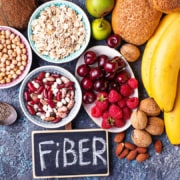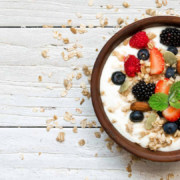Translating Carbohydrate Quality Into Evidence-Based, Consumer-Relevant Approaches
Consumer confusion about carbohydrates can lead to restriction diets with low overall healthfulness. Ultimately, this project aims to help consumers select healthier choices among food sources of carbohydrates by merging the scientific evidence with consumer perspectives. NORC at the University of Chicago is conducting research to understand how consumers make decisions about the healthfulness of carbohydrate foods and descriptive terminology that makes sense to them. Research insights can be applied by health professionals communicating with consumers about carbohydrate food choices consistent with healthy diet patterns.
Joint IAFNS-IFT Webinar: Food Innovations Using Fiber and Non-Digestible Carbohydrates for Health Benefits


The webinar is a collaboration between the Institute of Food Technologists (IFT) and the Institute for the Advancement of Food and Nutrition Sciences (IAFNS).
Presenters in the webinar include:
Joanne Slavin, University of Minnesota
Paula Trumbo, Retired FDA
Bruce Hamaker, Purdue University
Nicola McKewon, Boston Univ &
Kara Livingston Staffier, Consultant
Hannah Holscher, University of Illinois Urbana-Champaign
This webinar enables food product developers to formulate using fibers that deliver human health benefits. Experienced academic and regulatory experts will address how to determine whether a specific “added” fiber has a human health benefit and can be counted as fiber on the label, whether it has a “prebiotic” effect. The webinar also explores the advantages of blending fibers such as for a medical food application, as well as introduce tools to help you evaluate digestive tolerance and select a fiber with demonstrated human health effects through randomized clinical trials.
The webinar is a collaboration between the Institute of Food Technologists (IFT) and the Institute for the Advancement of Food and Nutrition Sciences (IAFNS).
This project was supported by the IAFNS Carbohydrates Committee.
The Scientific Basis of Communicating Carbohydrate Quality
A workshop was convened jointly with Diabetes Canada to advance the dialogue between scientists and regulatory experts on science-based indices that can be used in communicating physiologic effects of carbohydrates in foods. Experts agreed that the carbohydrate quality of a food would take into account multiple factors, including whole food credentials, the glycemic response to the food, and fiber content as well as nutrients to limit.
This science dialogue was supported by IAFNS Carbohydrates Committee.
Metabolic and Physiological Effects of Added Fibers for Children Across the Age Spectrum
Fibers added to foods may provide specific health benefits, but these relationships would benefit from research specifically on children rather than extrapolated from adults. This project will prioritize research needed to understand the relationship between fibers added to foods and support specific health outcomes at varying stages from young children through teens. The long term goal is to improve dietary fiber recommendations for children across the age spectrum.
Institution: Tufts Medical Center
Principal Investigator: Nanguneri Nirmala, PhD
Year Awarded: 2021
View this project on the Center for Open Science’s Open Science Framework.
Read more: Physiologic Effects Of Isolated Or Synthetic Dietary Fiber In Children: A Scoping Review
This work was supported by the IAFNS Carbohydrates Committee.
Evidence Map on the Relationship Between Exposure to Dietary Sweetness and Body Weight-Related Outcomes in Adults
Dietary recommendations from numerous governmental and health organizations recommend reduced intake of added sugars due to the health risks, including the risk of overweight and obesity. Some recommendations include avoiding dietary sweetness - regardless of the source - based on the hypothesis that reduced exposure to dietary sweetness will reduce the preference and desire for sweet foods/beverages. Given the limited or lack of association between dietary sweetness and food choice, it is unclear whether reducing dietary sweetness would result in beneficial changes in body composition. Before a conclusion on the association between dietary sweetness and body weight could be determined, it was necessary to determine the availability of evidence in the published literature. This evidence map was conducted to characterize the evidence on the association between dietary sweetness and body weight-related outcomes. The objective of this work was to determine whether there was sufficient evidence to conduct a systematic evidence review and identify future research priorities.
Institution: USDA Agricultural Research Service
Principal Investigators: Kelly Higgins, PhD; David Baer, PhD
Year Awarded: 2021
View a recording of IAFNS' April 20 webinar "Dietary Sweetness & Body Weight: What Do We Know and Where Do We Go From Here?"
View this project on the Center for Open Science’s Open Science Framework here.
This work is supported by the IAFNS Low- and No-Calorie Sweeteners Committee and Carbohydrates Committee.




